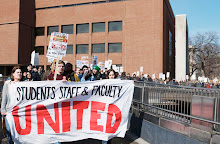Guess who proposed stripping collective-bargaining rights from most public-college faculty members in Ohio? Bruce E. Johnson, aka the president of the state's Inter-University Council! Ohio's Senate recently passed the proposal as part of its evisceration of collective-bargaining rights in the public sector.
His reasoning?
"We are anticipating significant budget cuts, and so we view this as a rational step in terms of moderating our expenses on campus," Mr. Johnson said. "It is a leverage issue. It enables us to have more influence on scheduling issues and faculty-pay issues."
In other words, the bottom line trumps internationally recognized labor rights. The association's advocacy of this position also betrays pledges made by public-university presidents to remain neutral in the legislative debate on collective bargaining rights. The pending legislation classifies most faculty as management and hence bars them from bargaining collectively. Faculty are management, these folks argue, because we serve on powerless faculty senates and vote on things such as hiring, promotion, and tenure.
Wednesday, March 9, 2011
Tuesday, March 8, 2011
Ex-lawmakers as Regents
Still stinging from the last round of Regents' appointments, the DFL is striking back with a bill that would limit the number of ex-lawmakers that can serve as Regents. DFLers are miffed by the selection of two former Republican representatives, Steven Sviggum and Laura Brod. These two appointments bring the total number of lawmakers on the Board of Regents to three, which is one-fourth of the board. What irks me about the Regents is not the number of lawmakers who serve as Regents but the rubber stamping of the administration's lousy proposals. This bill will do nothing to fix that...and it doesn't have a snow ball's chance in hell of passing anyhow.
Monday, March 7, 2011
This week @Minnesota
More university PR featured on You Tube. So far there have been four installments.
Sunday, March 6, 2011
Academic freedom and the corporate university
Check out Bill Gleason's post on the Chronicle's Brainstorm page. Bill is a faculty member at the University of Minnesota. He draws on some examples from the University of Minnesota to illustrate how corporate money undermines academic freedom and compromises research ethics.
More propaganda...
As part of its propaganda campaign, the U has released a study about the U's economic impact on the state of Minnesota. Since the U paid for the report, the results are undoubtedly quite satisfactory to administrators. The message: the U is a good economic investment, so give us more money. One can view the equivalent of the executive summary at the link above. Madradprof did not see a link to the full report there. Setting aside the idiocy of contracting the report in the first place, the report strikes me as utterly unconvincing. The main claim is that through the direct money that the U spends, and the indirect spending that results from others who spend that money in turn--the multiplier effect--the U contributes gazillions of dollars to the state's economy and provides lots of jobs. Ok, so what? By this logic using this money for other public services would be just as beneficial in that it would also create jobs and put money into the economy. So why give the money to the U? The case for research money is a little more convincing, since this money comes from outside the state, but they omit that these grants don't cover their costs and are in effect subsidized by bonding bills--needed to build the fancy facilities to carry out the research--and tuition-generating units of the university.
The company that prepared the economic impact report, Tripp Umbach, wrote another report for the U in 2004 to convince legislators to sink money into biomedical venture capitalism. The report claimed that this investment would create over 12,000 jobs. Alas, things have not turned out so well. One expert consulted back in 2004 commented, "One should always be leery of written-to-order studies."
The company that prepared the economic impact report, Tripp Umbach, wrote another report for the U in 2004 to convince legislators to sink money into biomedical venture capitalism. The report claimed that this investment would create over 12,000 jobs. Alas, things have not turned out so well. One expert consulted back in 2004 commented, "One should always be leery of written-to-order studies."
P&As get screwed...again
The admin has decided once again to place much of the burden of adjustment of budgetary constraints on the backs of P&A employees. The U currently provides P&As with 11 years of service one year of notice before layoffs. The proposal will cut it to six months. This change in policy is less egregious than the long-held practice of simultaneously issuing a non-renewal notice and an appointment letter to P&As. By doing this, the U gains enormous flexibility in controlling the size of the P&A workforce. But this flexibility comes at the price of treating P&A staff as disposable workers. Those who get the boot not only lose their job. Since the window for applying for severance pay is 60 days after the termination notice, many employees could potentially miss the opportunity to claim their severance and extended medical benefits. Madradprof's P&A contacts state that this practice is rife at the U for instructional P&A. Any chance that faculty senate committees would initiate a resolution condemning this practice?
The high cost of college sports
PBS's Need to Know recently aired a segment on the impact of big athletic spending on higher education. It does a nice job of demonstrating that students are subsidizing lavish spending on Division I athletics through high fees and that universities continue to shovel money into athletics while allowing classroom infrastructure to fall into disrepair and cutting academic programs to the bone.
Saturday, March 5, 2011
How the FDA got the Markingson case wrong
Carl Elliott digs deeper into the U's claim that the FDA's investigation of Markingson's death is sufficient to exonerate the U. He concludes that it is not. Why? The FDA's investigation was shoddy.
Wednesday, March 2, 2011
Yet another bill to rein in administrators
State legislators have already proposed legislation that would limit the power of university administrators to raise tuition. Now Senator Jeremy Miller (R-Winona) has introduced legislation to reduce spending on administrative costs by 10% at state universities. Interesting....the devil is in the details. Money is fungible so I worry that academic programs, which are already suffering from years of deep cuts, would take the hit. In spite of reduced funding, the enthusiasm of administrators for new building projects and new reporting requirements for faculty (which of course means that more administrators must be hired to conduct the monitoring) has not waned. Faculty have proven unable (and perhaps unwilling) to act collectively to alter this course. So now the legislature weighs in. Faculty must find a way to open a productive dialogue with these legislators.
Tenure protections weakened at University of Louisiana
The changes at the University of Louisiana now permit administrators to layoff professors whose programs have been discontinued and reduced the required notice for layoffs.
Subscribe to:
Comments (Atom)

